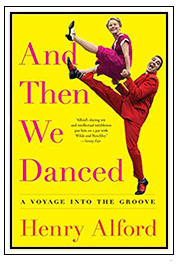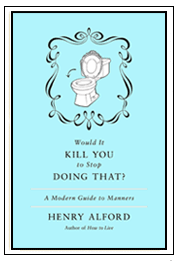First Review of New Book
November 19th, 2011So, the two big pre-publication reviews that a book is likely to get are those from Publisher’s Weekly and Kirkus Reviews. I’ve just received a review from the latter, for my book about manners that will come out in January. The funny thing about Kirkus reviews is that they always close with a single sentence, pulled out from the preceding paragraph, that is what I call the blammo sentence. Meaning that, if the preceding 300 word-long review is marked by simmering disappointment, then the blammo sentence will be an outright dismissal, a cannon volley, a thunderclap.
So you can imagine my relief when, after a couple of hundred words bearing phrases like “highly idiosyncratic” and “highly subjective”, the blammo sentence below was actually a nice blammo—a dollop of whipped cream, a bit of tongue.
KIRKUS REVIEW: Alford (How to Live: A Search for Wisdom from Old People (While They Are Still on This Earth)
, 2009, etc.) embarks on an idiosyncratic excursion into the land of civility. Manners became of interest to the author when he came across a comment by Edmund Burke that manners were more important than laws, and realized how true that was for him. Each day, his life had “been far more affected by the small indignities, or the tiny acts of grace, than by any piece of governmental legislation.” A book project was born: “I decided to study these tiny-but-huge things: to read about them, and travel in their name…to hold up a magnifying glass to unattractive habits that I stumble upon, be they my own or others’.” In his highly subjective, modestly twisted, rudeness-barely-checked way, Alford engages random aspects of manners. He commiserates with readers over choosing the right greeting—hug, kiss, handshake, fist bump, shoulder grab—and tuning into the error of excessive self-deprecation or the slippery slope of formal, hierarchical protocols: “highly arbitrary, difficult to parse, and subject to change without notice.” His focus can be broad, as suggesting that tone trumps action (or, paraphrasing Noel Coward, “it’s all a matter of lighting”), but often as not he screws down tight on small example from his life—as a tour guide or online manners coach for instance, when he shows himself to be a discreet, keen observer rippling with bad-boy humor.
Alford is a razory-wicked, fun guy to be around, and each of his stories are like those “tiny acts of grace” brightening your day.
UPDATE: And here’s the Publisher’s Weekly review.



















